Mental Health Assignment: Therapeutic Interventions and Barriers
VerifiedAdded on 2023/03/31
|10
|2022
|250
Report
AI Summary
This assignment delves into the complexities of major depression, presenting a case study of a 17-year-old student struggling with career-related anxiety and mood swings. It explores various therapeutic interventions, including both medicinal therapies like SSRIs, SNRIs, and psychotherapy, detailing their applications and importance. The report also critically examines the enablers and barriers within the Australian healthcare system, highlighting organizational challenges, lack of services, and the crucial role of family support in patient recovery. The assignment underscores the need for improved hospital management, updated facilities, and the importance of healthcare professionals in providing effective treatment, ultimately advocating for a holistic approach to mental health care.
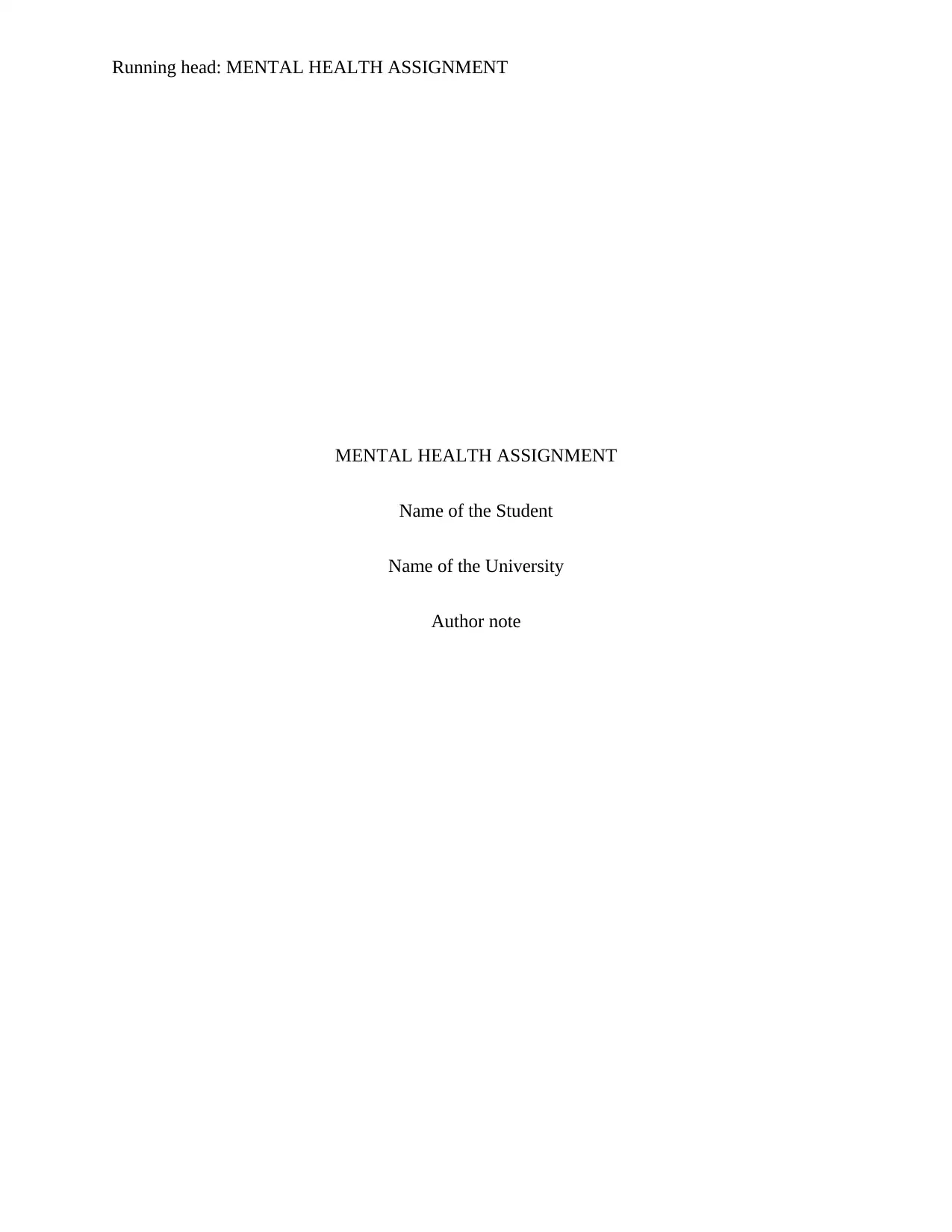
Running head: MENTAL HEALTH ASSIGNMENT
MENTAL HEALTH ASSIGNMENT
Name of the Student
Name of the University
Author note
MENTAL HEALTH ASSIGNMENT
Name of the Student
Name of the University
Author note
Paraphrase This Document
Need a fresh take? Get an instant paraphrase of this document with our AI Paraphraser
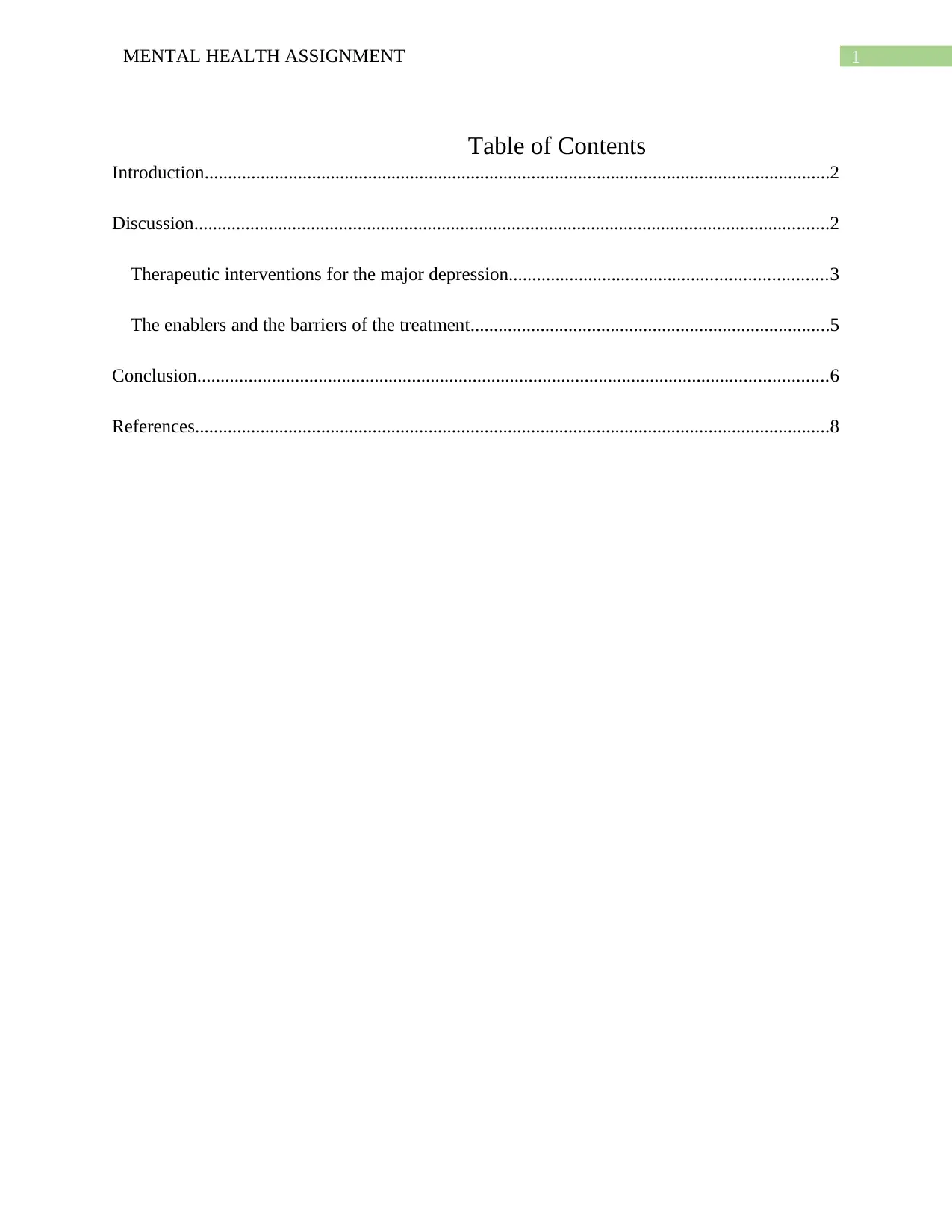
1MENTAL HEALTH ASSIGNMENT
Table of Contents
Introduction......................................................................................................................................2
Discussion........................................................................................................................................2
Therapeutic interventions for the major depression....................................................................3
The enablers and the barriers of the treatment.............................................................................5
Conclusion.......................................................................................................................................6
References........................................................................................................................................8
Table of Contents
Introduction......................................................................................................................................2
Discussion........................................................................................................................................2
Therapeutic interventions for the major depression....................................................................3
The enablers and the barriers of the treatment.............................................................................5
Conclusion.......................................................................................................................................6
References........................................................................................................................................8
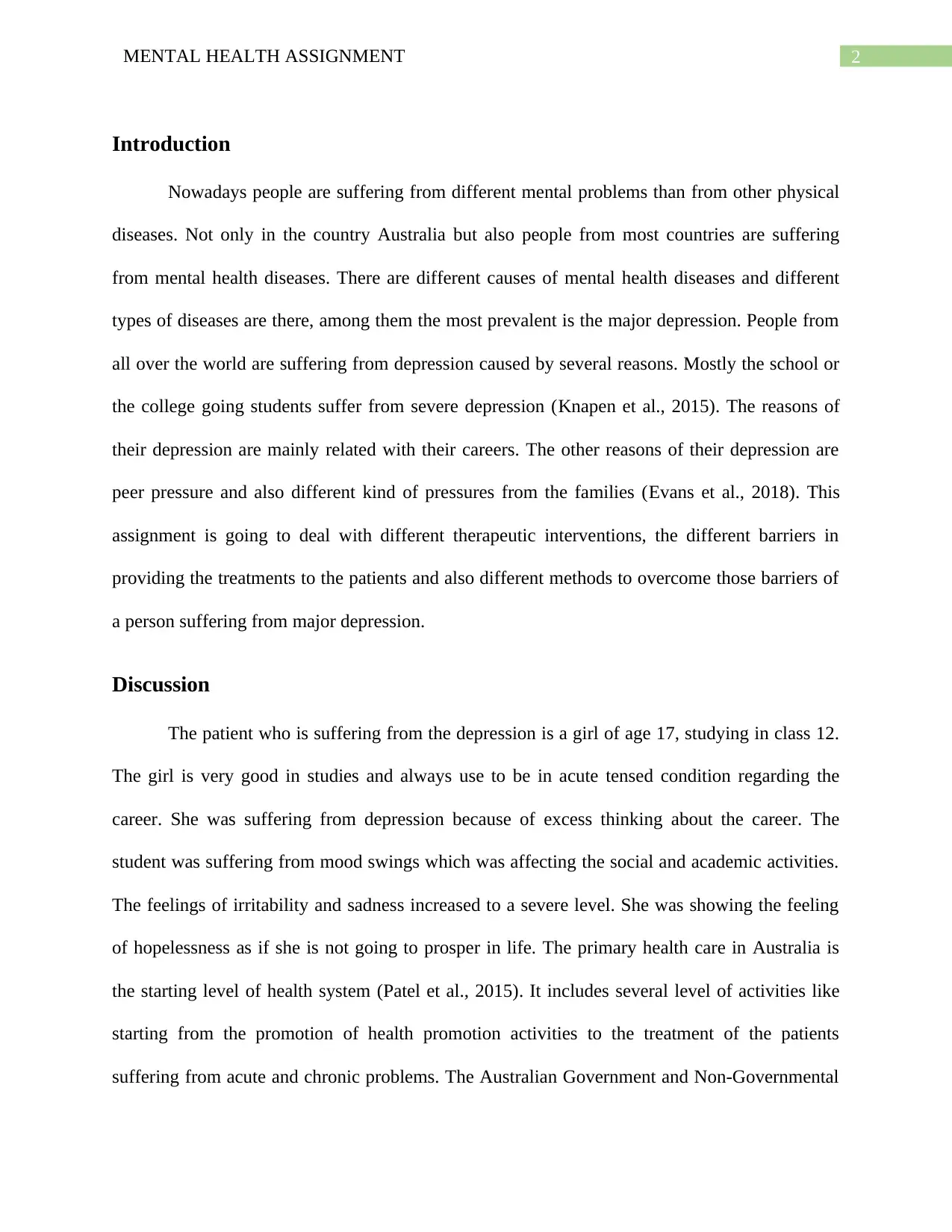
2MENTAL HEALTH ASSIGNMENT
Introduction
Nowadays people are suffering from different mental problems than from other physical
diseases. Not only in the country Australia but also people from most countries are suffering
from mental health diseases. There are different causes of mental health diseases and different
types of diseases are there, among them the most prevalent is the major depression. People from
all over the world are suffering from depression caused by several reasons. Mostly the school or
the college going students suffer from severe depression (Knapen et al., 2015). The reasons of
their depression are mainly related with their careers. The other reasons of their depression are
peer pressure and also different kind of pressures from the families (Evans et al., 2018). This
assignment is going to deal with different therapeutic interventions, the different barriers in
providing the treatments to the patients and also different methods to overcome those barriers of
a person suffering from major depression.
Discussion
The patient who is suffering from the depression is a girl of age 17, studying in class 12.
The girl is very good in studies and always use to be in acute tensed condition regarding the
career. She was suffering from depression because of excess thinking about the career. The
student was suffering from mood swings which was affecting the social and academic activities.
The feelings of irritability and sadness increased to a severe level. She was showing the feeling
of hopelessness as if she is not going to prosper in life. The primary health care in Australia is
the starting level of health system (Patel et al., 2015). It includes several level of activities like
starting from the promotion of health promotion activities to the treatment of the patients
suffering from acute and chronic problems. The Australian Government and Non-Governmental
Introduction
Nowadays people are suffering from different mental problems than from other physical
diseases. Not only in the country Australia but also people from most countries are suffering
from mental health diseases. There are different causes of mental health diseases and different
types of diseases are there, among them the most prevalent is the major depression. People from
all over the world are suffering from depression caused by several reasons. Mostly the school or
the college going students suffer from severe depression (Knapen et al., 2015). The reasons of
their depression are mainly related with their careers. The other reasons of their depression are
peer pressure and also different kind of pressures from the families (Evans et al., 2018). This
assignment is going to deal with different therapeutic interventions, the different barriers in
providing the treatments to the patients and also different methods to overcome those barriers of
a person suffering from major depression.
Discussion
The patient who is suffering from the depression is a girl of age 17, studying in class 12.
The girl is very good in studies and always use to be in acute tensed condition regarding the
career. She was suffering from depression because of excess thinking about the career. The
student was suffering from mood swings which was affecting the social and academic activities.
The feelings of irritability and sadness increased to a severe level. She was showing the feeling
of hopelessness as if she is not going to prosper in life. The primary health care in Australia is
the starting level of health system (Patel et al., 2015). It includes several level of activities like
starting from the promotion of health promotion activities to the treatment of the patients
suffering from acute and chronic problems. The Australian Government and Non-Governmental
⊘ This is a preview!⊘
Do you want full access?
Subscribe today to unlock all pages.

Trusted by 1+ million students worldwide
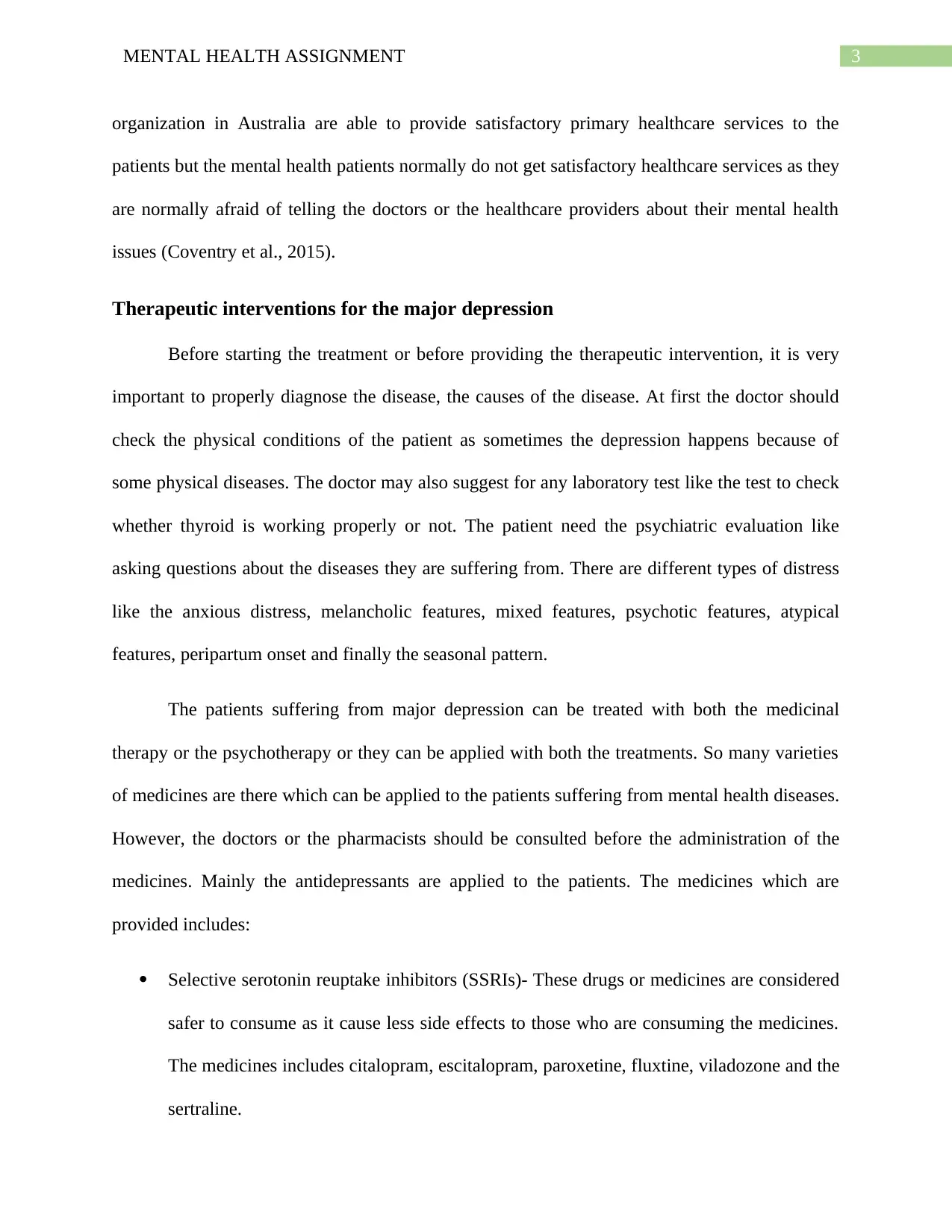
3MENTAL HEALTH ASSIGNMENT
organization in Australia are able to provide satisfactory primary healthcare services to the
patients but the mental health patients normally do not get satisfactory healthcare services as they
are normally afraid of telling the doctors or the healthcare providers about their mental health
issues (Coventry et al., 2015).
Therapeutic interventions for the major depression
Before starting the treatment or before providing the therapeutic intervention, it is very
important to properly diagnose the disease, the causes of the disease. At first the doctor should
check the physical conditions of the patient as sometimes the depression happens because of
some physical diseases. The doctor may also suggest for any laboratory test like the test to check
whether thyroid is working properly or not. The patient need the psychiatric evaluation like
asking questions about the diseases they are suffering from. There are different types of distress
like the anxious distress, melancholic features, mixed features, psychotic features, atypical
features, peripartum onset and finally the seasonal pattern.
The patients suffering from major depression can be treated with both the medicinal
therapy or the psychotherapy or they can be applied with both the treatments. So many varieties
of medicines are there which can be applied to the patients suffering from mental health diseases.
However, the doctors or the pharmacists should be consulted before the administration of the
medicines. Mainly the antidepressants are applied to the patients. The medicines which are
provided includes:
Selective serotonin reuptake inhibitors (SSRIs)- These drugs or medicines are considered
safer to consume as it cause less side effects to those who are consuming the medicines.
The medicines includes citalopram, escitalopram, paroxetine, fluxtine, viladozone and the
sertraline.
organization in Australia are able to provide satisfactory primary healthcare services to the
patients but the mental health patients normally do not get satisfactory healthcare services as they
are normally afraid of telling the doctors or the healthcare providers about their mental health
issues (Coventry et al., 2015).
Therapeutic interventions for the major depression
Before starting the treatment or before providing the therapeutic intervention, it is very
important to properly diagnose the disease, the causes of the disease. At first the doctor should
check the physical conditions of the patient as sometimes the depression happens because of
some physical diseases. The doctor may also suggest for any laboratory test like the test to check
whether thyroid is working properly or not. The patient need the psychiatric evaluation like
asking questions about the diseases they are suffering from. There are different types of distress
like the anxious distress, melancholic features, mixed features, psychotic features, atypical
features, peripartum onset and finally the seasonal pattern.
The patients suffering from major depression can be treated with both the medicinal
therapy or the psychotherapy or they can be applied with both the treatments. So many varieties
of medicines are there which can be applied to the patients suffering from mental health diseases.
However, the doctors or the pharmacists should be consulted before the administration of the
medicines. Mainly the antidepressants are applied to the patients. The medicines which are
provided includes:
Selective serotonin reuptake inhibitors (SSRIs)- These drugs or medicines are considered
safer to consume as it cause less side effects to those who are consuming the medicines.
The medicines includes citalopram, escitalopram, paroxetine, fluxtine, viladozone and the
sertraline.
Paraphrase This Document
Need a fresh take? Get an instant paraphrase of this document with our AI Paraphraser
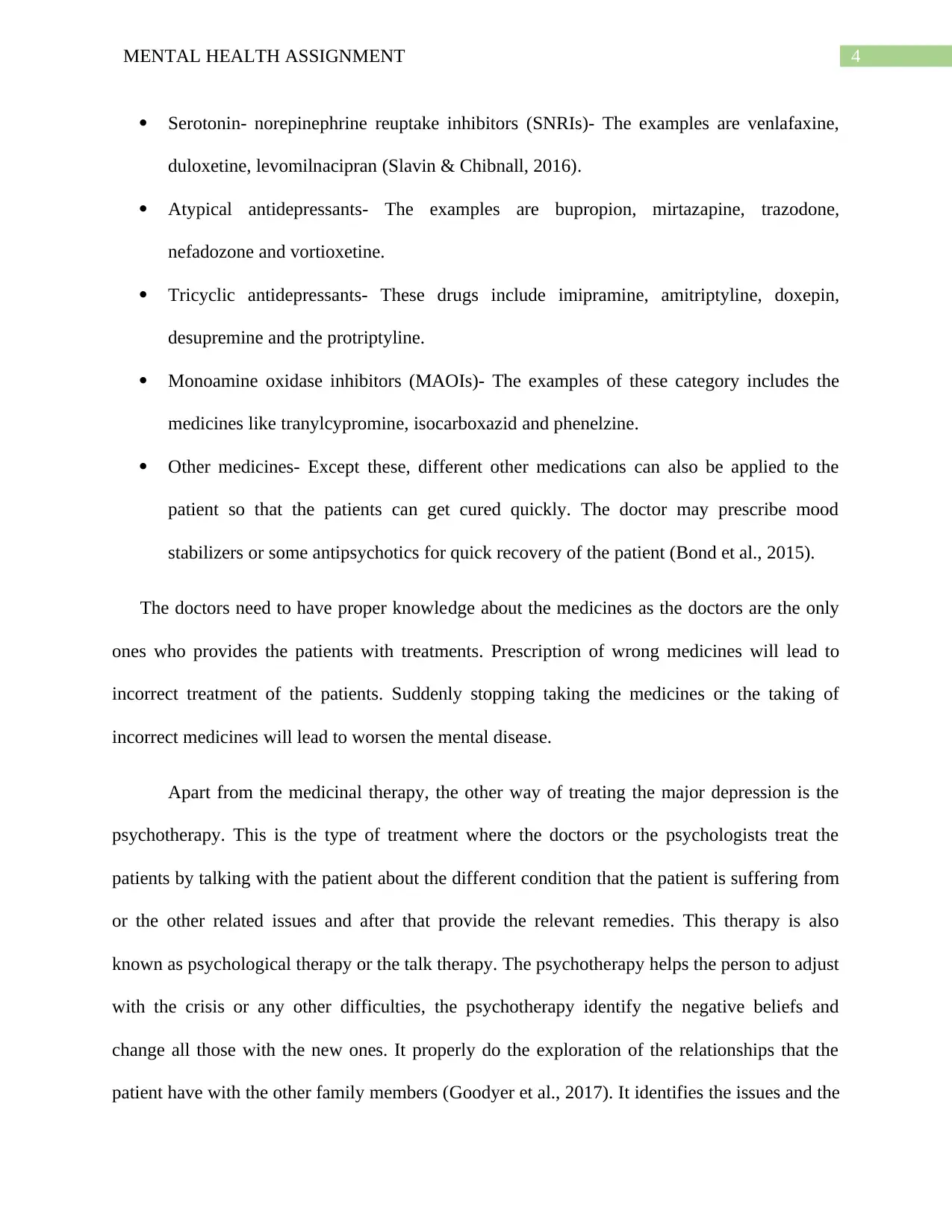
4MENTAL HEALTH ASSIGNMENT
Serotonin- norepinephrine reuptake inhibitors (SNRIs)- The examples are venlafaxine,
duloxetine, levomilnacipran (Slavin & Chibnall, 2016).
Atypical antidepressants- The examples are bupropion, mirtazapine, trazodone,
nefadozone and vortioxetine.
Tricyclic antidepressants- These drugs include imipramine, amitriptyline, doxepin,
desupremine and the protriptyline.
Monoamine oxidase inhibitors (MAOIs)- The examples of these category includes the
medicines like tranylcypromine, isocarboxazid and phenelzine.
Other medicines- Except these, different other medications can also be applied to the
patient so that the patients can get cured quickly. The doctor may prescribe mood
stabilizers or some antipsychotics for quick recovery of the patient (Bond et al., 2015).
The doctors need to have proper knowledge about the medicines as the doctors are the only
ones who provides the patients with treatments. Prescription of wrong medicines will lead to
incorrect treatment of the patients. Suddenly stopping taking the medicines or the taking of
incorrect medicines will lead to worsen the mental disease.
Apart from the medicinal therapy, the other way of treating the major depression is the
psychotherapy. This is the type of treatment where the doctors or the psychologists treat the
patients by talking with the patient about the different condition that the patient is suffering from
or the other related issues and after that provide the relevant remedies. This therapy is also
known as psychological therapy or the talk therapy. The psychotherapy helps the person to adjust
with the crisis or any other difficulties, the psychotherapy identify the negative beliefs and
change all those with the new ones. It properly do the exploration of the relationships that the
patient have with the other family members (Goodyer et al., 2017). It identifies the issues and the
Serotonin- norepinephrine reuptake inhibitors (SNRIs)- The examples are venlafaxine,
duloxetine, levomilnacipran (Slavin & Chibnall, 2016).
Atypical antidepressants- The examples are bupropion, mirtazapine, trazodone,
nefadozone and vortioxetine.
Tricyclic antidepressants- These drugs include imipramine, amitriptyline, doxepin,
desupremine and the protriptyline.
Monoamine oxidase inhibitors (MAOIs)- The examples of these category includes the
medicines like tranylcypromine, isocarboxazid and phenelzine.
Other medicines- Except these, different other medications can also be applied to the
patient so that the patients can get cured quickly. The doctor may prescribe mood
stabilizers or some antipsychotics for quick recovery of the patient (Bond et al., 2015).
The doctors need to have proper knowledge about the medicines as the doctors are the only
ones who provides the patients with treatments. Prescription of wrong medicines will lead to
incorrect treatment of the patients. Suddenly stopping taking the medicines or the taking of
incorrect medicines will lead to worsen the mental disease.
Apart from the medicinal therapy, the other way of treating the major depression is the
psychotherapy. This is the type of treatment where the doctors or the psychologists treat the
patients by talking with the patient about the different condition that the patient is suffering from
or the other related issues and after that provide the relevant remedies. This therapy is also
known as psychological therapy or the talk therapy. The psychotherapy helps the person to adjust
with the crisis or any other difficulties, the psychotherapy identify the negative beliefs and
change all those with the new ones. It properly do the exploration of the relationships that the
patient have with the other family members (Goodyer et al., 2017). It identifies the issues and the
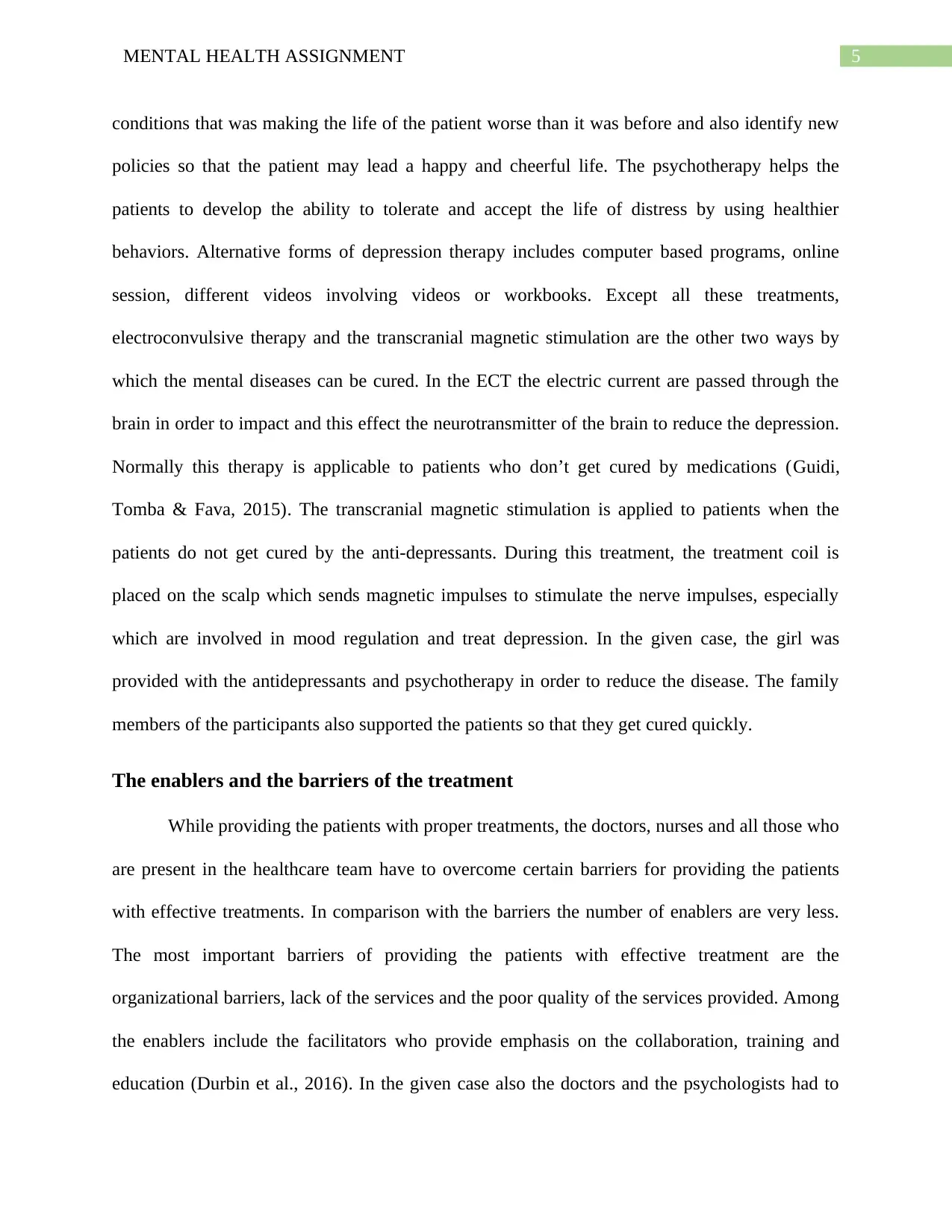
5MENTAL HEALTH ASSIGNMENT
conditions that was making the life of the patient worse than it was before and also identify new
policies so that the patient may lead a happy and cheerful life. The psychotherapy helps the
patients to develop the ability to tolerate and accept the life of distress by using healthier
behaviors. Alternative forms of depression therapy includes computer based programs, online
session, different videos involving videos or workbooks. Except all these treatments,
electroconvulsive therapy and the transcranial magnetic stimulation are the other two ways by
which the mental diseases can be cured. In the ECT the electric current are passed through the
brain in order to impact and this effect the neurotransmitter of the brain to reduce the depression.
Normally this therapy is applicable to patients who don’t get cured by medications (Guidi,
Tomba & Fava, 2015). The transcranial magnetic stimulation is applied to patients when the
patients do not get cured by the anti-depressants. During this treatment, the treatment coil is
placed on the scalp which sends magnetic impulses to stimulate the nerve impulses, especially
which are involved in mood regulation and treat depression. In the given case, the girl was
provided with the antidepressants and psychotherapy in order to reduce the disease. The family
members of the participants also supported the patients so that they get cured quickly.
The enablers and the barriers of the treatment
While providing the patients with proper treatments, the doctors, nurses and all those who
are present in the healthcare team have to overcome certain barriers for providing the patients
with effective treatments. In comparison with the barriers the number of enablers are very less.
The most important barriers of providing the patients with effective treatment are the
organizational barriers, lack of the services and the poor quality of the services provided. Among
the enablers include the facilitators who provide emphasis on the collaboration, training and
education (Durbin et al., 2016). In the given case also the doctors and the psychologists had to
conditions that was making the life of the patient worse than it was before and also identify new
policies so that the patient may lead a happy and cheerful life. The psychotherapy helps the
patients to develop the ability to tolerate and accept the life of distress by using healthier
behaviors. Alternative forms of depression therapy includes computer based programs, online
session, different videos involving videos or workbooks. Except all these treatments,
electroconvulsive therapy and the transcranial magnetic stimulation are the other two ways by
which the mental diseases can be cured. In the ECT the electric current are passed through the
brain in order to impact and this effect the neurotransmitter of the brain to reduce the depression.
Normally this therapy is applicable to patients who don’t get cured by medications (Guidi,
Tomba & Fava, 2015). The transcranial magnetic stimulation is applied to patients when the
patients do not get cured by the anti-depressants. During this treatment, the treatment coil is
placed on the scalp which sends magnetic impulses to stimulate the nerve impulses, especially
which are involved in mood regulation and treat depression. In the given case, the girl was
provided with the antidepressants and psychotherapy in order to reduce the disease. The family
members of the participants also supported the patients so that they get cured quickly.
The enablers and the barriers of the treatment
While providing the patients with proper treatments, the doctors, nurses and all those who
are present in the healthcare team have to overcome certain barriers for providing the patients
with effective treatments. In comparison with the barriers the number of enablers are very less.
The most important barriers of providing the patients with effective treatment are the
organizational barriers, lack of the services and the poor quality of the services provided. Among
the enablers include the facilitators who provide emphasis on the collaboration, training and
education (Durbin et al., 2016). In the given case also the doctors and the psychologists had to
⊘ This is a preview!⊘
Do you want full access?
Subscribe today to unlock all pages.

Trusted by 1+ million students worldwide
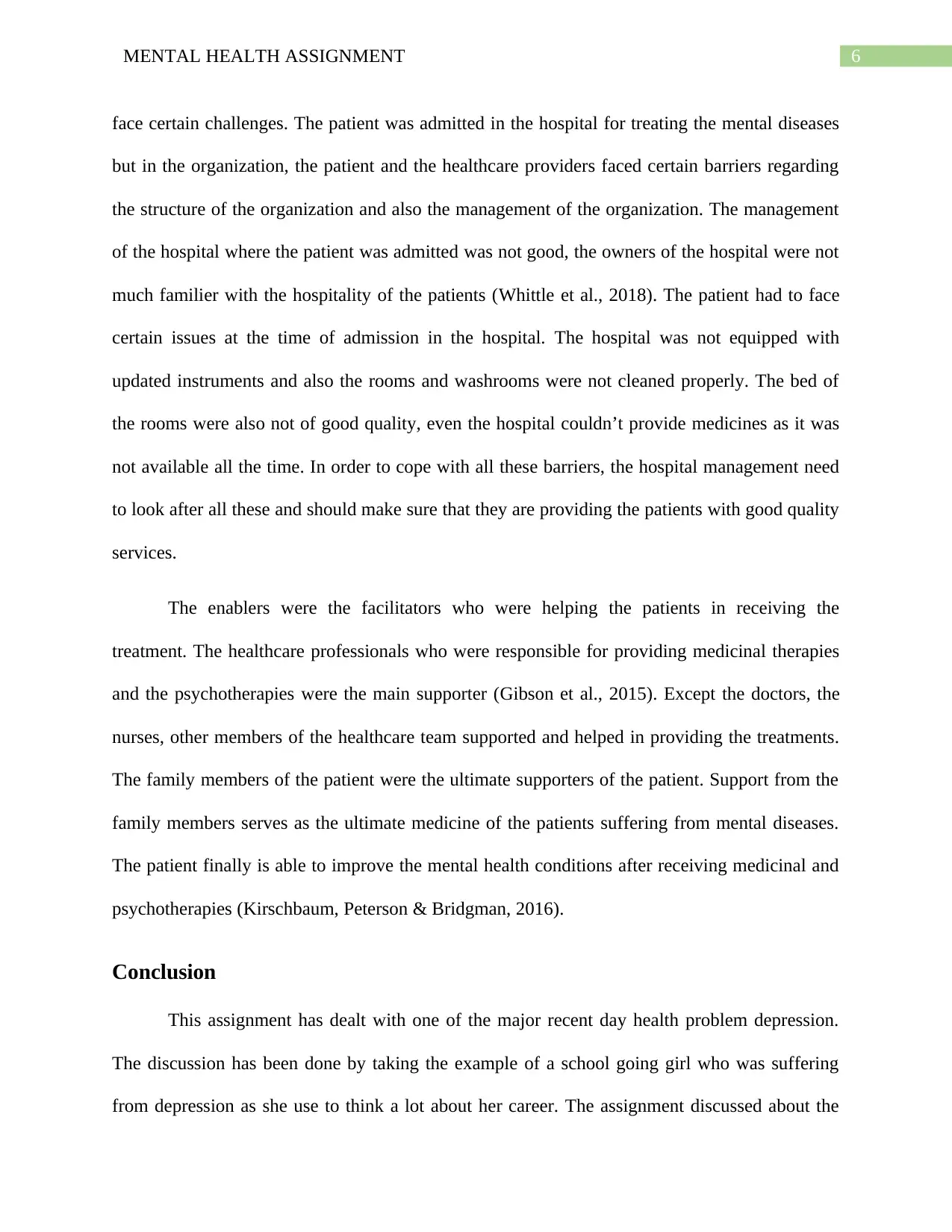
6MENTAL HEALTH ASSIGNMENT
face certain challenges. The patient was admitted in the hospital for treating the mental diseases
but in the organization, the patient and the healthcare providers faced certain barriers regarding
the structure of the organization and also the management of the organization. The management
of the hospital where the patient was admitted was not good, the owners of the hospital were not
much familier with the hospitality of the patients (Whittle et al., 2018). The patient had to face
certain issues at the time of admission in the hospital. The hospital was not equipped with
updated instruments and also the rooms and washrooms were not cleaned properly. The bed of
the rooms were also not of good quality, even the hospital couldn’t provide medicines as it was
not available all the time. In order to cope with all these barriers, the hospital management need
to look after all these and should make sure that they are providing the patients with good quality
services.
The enablers were the facilitators who were helping the patients in receiving the
treatment. The healthcare professionals who were responsible for providing medicinal therapies
and the psychotherapies were the main supporter (Gibson et al., 2015). Except the doctors, the
nurses, other members of the healthcare team supported and helped in providing the treatments.
The family members of the patient were the ultimate supporters of the patient. Support from the
family members serves as the ultimate medicine of the patients suffering from mental diseases.
The patient finally is able to improve the mental health conditions after receiving medicinal and
psychotherapies (Kirschbaum, Peterson & Bridgman, 2016).
Conclusion
This assignment has dealt with one of the major recent day health problem depression.
The discussion has been done by taking the example of a school going girl who was suffering
from depression as she use to think a lot about her career. The assignment discussed about the
face certain challenges. The patient was admitted in the hospital for treating the mental diseases
but in the organization, the patient and the healthcare providers faced certain barriers regarding
the structure of the organization and also the management of the organization. The management
of the hospital where the patient was admitted was not good, the owners of the hospital were not
much familier with the hospitality of the patients (Whittle et al., 2018). The patient had to face
certain issues at the time of admission in the hospital. The hospital was not equipped with
updated instruments and also the rooms and washrooms were not cleaned properly. The bed of
the rooms were also not of good quality, even the hospital couldn’t provide medicines as it was
not available all the time. In order to cope with all these barriers, the hospital management need
to look after all these and should make sure that they are providing the patients with good quality
services.
The enablers were the facilitators who were helping the patients in receiving the
treatment. The healthcare professionals who were responsible for providing medicinal therapies
and the psychotherapies were the main supporter (Gibson et al., 2015). Except the doctors, the
nurses, other members of the healthcare team supported and helped in providing the treatments.
The family members of the patient were the ultimate supporters of the patient. Support from the
family members serves as the ultimate medicine of the patients suffering from mental diseases.
The patient finally is able to improve the mental health conditions after receiving medicinal and
psychotherapies (Kirschbaum, Peterson & Bridgman, 2016).
Conclusion
This assignment has dealt with one of the major recent day health problem depression.
The discussion has been done by taking the example of a school going girl who was suffering
from depression as she use to think a lot about her career. The assignment discussed about the
Paraphrase This Document
Need a fresh take? Get an instant paraphrase of this document with our AI Paraphraser

7MENTAL HEALTH ASSIGNMENT
different interventions to be followed to treat the disease and also the different enablers and the
barriers which the patient had to face.
different interventions to be followed to treat the disease and also the different enablers and the
barriers which the patient had to face.
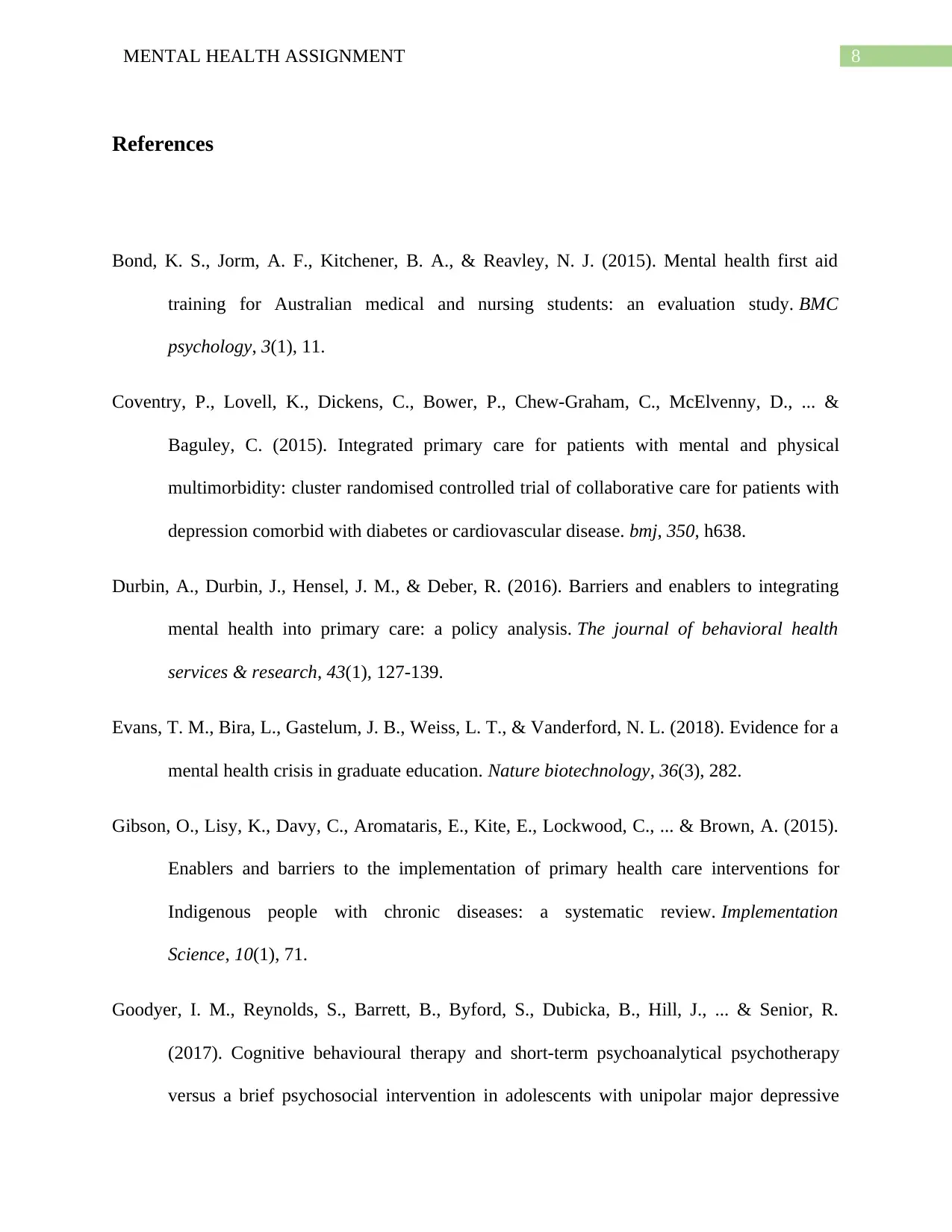
8MENTAL HEALTH ASSIGNMENT
References
Bond, K. S., Jorm, A. F., Kitchener, B. A., & Reavley, N. J. (2015). Mental health first aid
training for Australian medical and nursing students: an evaluation study. BMC
psychology, 3(1), 11.
Coventry, P., Lovell, K., Dickens, C., Bower, P., Chew-Graham, C., McElvenny, D., ... &
Baguley, C. (2015). Integrated primary care for patients with mental and physical
multimorbidity: cluster randomised controlled trial of collaborative care for patients with
depression comorbid with diabetes or cardiovascular disease. bmj, 350, h638.
Durbin, A., Durbin, J., Hensel, J. M., & Deber, R. (2016). Barriers and enablers to integrating
mental health into primary care: a policy analysis. The journal of behavioral health
services & research, 43(1), 127-139.
Evans, T. M., Bira, L., Gastelum, J. B., Weiss, L. T., & Vanderford, N. L. (2018). Evidence for a
mental health crisis in graduate education. Nature biotechnology, 36(3), 282.
Gibson, O., Lisy, K., Davy, C., Aromataris, E., Kite, E., Lockwood, C., ... & Brown, A. (2015).
Enablers and barriers to the implementation of primary health care interventions for
Indigenous people with chronic diseases: a systematic review. Implementation
Science, 10(1), 71.
Goodyer, I. M., Reynolds, S., Barrett, B., Byford, S., Dubicka, B., Hill, J., ... & Senior, R.
(2017). Cognitive behavioural therapy and short-term psychoanalytical psychotherapy
versus a brief psychosocial intervention in adolescents with unipolar major depressive
References
Bond, K. S., Jorm, A. F., Kitchener, B. A., & Reavley, N. J. (2015). Mental health first aid
training for Australian medical and nursing students: an evaluation study. BMC
psychology, 3(1), 11.
Coventry, P., Lovell, K., Dickens, C., Bower, P., Chew-Graham, C., McElvenny, D., ... &
Baguley, C. (2015). Integrated primary care for patients with mental and physical
multimorbidity: cluster randomised controlled trial of collaborative care for patients with
depression comorbid with diabetes or cardiovascular disease. bmj, 350, h638.
Durbin, A., Durbin, J., Hensel, J. M., & Deber, R. (2016). Barriers and enablers to integrating
mental health into primary care: a policy analysis. The journal of behavioral health
services & research, 43(1), 127-139.
Evans, T. M., Bira, L., Gastelum, J. B., Weiss, L. T., & Vanderford, N. L. (2018). Evidence for a
mental health crisis in graduate education. Nature biotechnology, 36(3), 282.
Gibson, O., Lisy, K., Davy, C., Aromataris, E., Kite, E., Lockwood, C., ... & Brown, A. (2015).
Enablers and barriers to the implementation of primary health care interventions for
Indigenous people with chronic diseases: a systematic review. Implementation
Science, 10(1), 71.
Goodyer, I. M., Reynolds, S., Barrett, B., Byford, S., Dubicka, B., Hill, J., ... & Senior, R.
(2017). Cognitive behavioural therapy and short-term psychoanalytical psychotherapy
versus a brief psychosocial intervention in adolescents with unipolar major depressive
⊘ This is a preview!⊘
Do you want full access?
Subscribe today to unlock all pages.

Trusted by 1+ million students worldwide
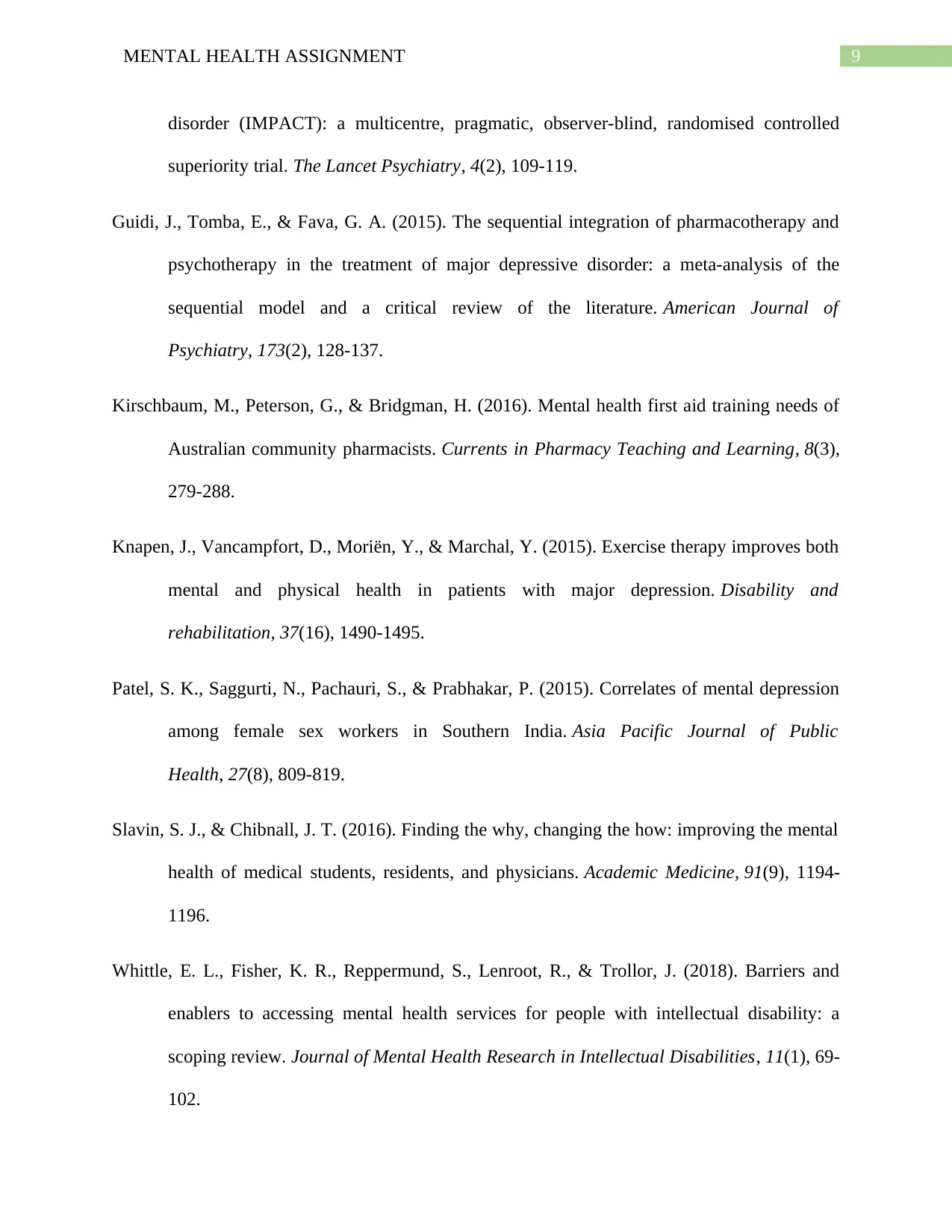
9MENTAL HEALTH ASSIGNMENT
disorder (IMPACT): a multicentre, pragmatic, observer-blind, randomised controlled
superiority trial. The Lancet Psychiatry, 4(2), 109-119.
Guidi, J., Tomba, E., & Fava, G. A. (2015). The sequential integration of pharmacotherapy and
psychotherapy in the treatment of major depressive disorder: a meta-analysis of the
sequential model and a critical review of the literature. American Journal of
Psychiatry, 173(2), 128-137.
Kirschbaum, M., Peterson, G., & Bridgman, H. (2016). Mental health first aid training needs of
Australian community pharmacists. Currents in Pharmacy Teaching and Learning, 8(3),
279-288.
Knapen, J., Vancampfort, D., Moriën, Y., & Marchal, Y. (2015). Exercise therapy improves both
mental and physical health in patients with major depression. Disability and
rehabilitation, 37(16), 1490-1495.
Patel, S. K., Saggurti, N., Pachauri, S., & Prabhakar, P. (2015). Correlates of mental depression
among female sex workers in Southern India. Asia Pacific Journal of Public
Health, 27(8), 809-819.
Slavin, S. J., & Chibnall, J. T. (2016). Finding the why, changing the how: improving the mental
health of medical students, residents, and physicians. Academic Medicine, 91(9), 1194-
1196.
Whittle, E. L., Fisher, K. R., Reppermund, S., Lenroot, R., & Trollor, J. (2018). Barriers and
enablers to accessing mental health services for people with intellectual disability: a
scoping review. Journal of Mental Health Research in Intellectual Disabilities, 11(1), 69-
102.
disorder (IMPACT): a multicentre, pragmatic, observer-blind, randomised controlled
superiority trial. The Lancet Psychiatry, 4(2), 109-119.
Guidi, J., Tomba, E., & Fava, G. A. (2015). The sequential integration of pharmacotherapy and
psychotherapy in the treatment of major depressive disorder: a meta-analysis of the
sequential model and a critical review of the literature. American Journal of
Psychiatry, 173(2), 128-137.
Kirschbaum, M., Peterson, G., & Bridgman, H. (2016). Mental health first aid training needs of
Australian community pharmacists. Currents in Pharmacy Teaching and Learning, 8(3),
279-288.
Knapen, J., Vancampfort, D., Moriën, Y., & Marchal, Y. (2015). Exercise therapy improves both
mental and physical health in patients with major depression. Disability and
rehabilitation, 37(16), 1490-1495.
Patel, S. K., Saggurti, N., Pachauri, S., & Prabhakar, P. (2015). Correlates of mental depression
among female sex workers in Southern India. Asia Pacific Journal of Public
Health, 27(8), 809-819.
Slavin, S. J., & Chibnall, J. T. (2016). Finding the why, changing the how: improving the mental
health of medical students, residents, and physicians. Academic Medicine, 91(9), 1194-
1196.
Whittle, E. L., Fisher, K. R., Reppermund, S., Lenroot, R., & Trollor, J. (2018). Barriers and
enablers to accessing mental health services for people with intellectual disability: a
scoping review. Journal of Mental Health Research in Intellectual Disabilities, 11(1), 69-
102.
1 out of 10
Related Documents
Your All-in-One AI-Powered Toolkit for Academic Success.
+13062052269
info@desklib.com
Available 24*7 on WhatsApp / Email
![[object Object]](/_next/static/media/star-bottom.7253800d.svg)
Unlock your academic potential
Copyright © 2020–2026 A2Z Services. All Rights Reserved. Developed and managed by ZUCOL.




